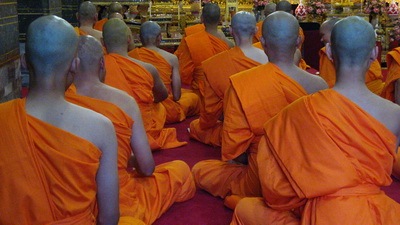
Beset by a painful economic downturn, clouded by political uncertainties and plagued by numerous human rights abuses attributed to the ruling junta, Thailand’s rulers are throwing a spanner in the media narrative by launching a controversial campaign to establish Buddhism as the country’s official religion.
The junta-appointed committee that is writing the country’s 20th constitution in a century is being actively pressured by Buddhist activists to insert a new clause: a state religion. However, an extremist Buddhist movement active both within the country and in neighboring Burma (Myanmar) is now threatening to send the project off the rails.
A recent call to arms by Thai monk Phra Apichart Punnajanto, abbot at one at one of Bangkok’s most prestigious and influential temples – Wat Benchamabopit – has come under fire. In a classic eye-for-an-eye religious diatribe, this holy man, this man of ‘peace’, advocated that for every Buddhist monk killed by Muslim insurgents in the south of the country a mosque should be burned to the ground.
It seems almost paradoxical to use the words ‘Buddhist’ and ‘extremism’ in the same sentence, such is the extent to which this darling of philosophical thought has cornered the market on the general concept of a ‘peaceful’ religion. However, make no mistake about it, Buddhism is no stranger to leaving its own mark on the annals recording the atrocities religion has inflicted upon humankind.
Take, for instance, attacks upon Europeans by Buddhist extremists in Burma in the 1930s, in response to a national call to conversion for those not already practicing Buddhism. Or the formidable Buddhist support extant in Japan during WWII for the home forces, so that peace could be restored once more to East Asia. In the 70s, Thai Buddhists actively encouraged the murder of Communists in the region, assuring all adherents that there would be no karmic consequence.
The foundations of Thai society are built upon three institutional cornerstones: monarchy, nation and religion. So intertwined have they become that it is sometimes difficult to entirely separate them. Not that the major players – the royal family, the military and the Buddhist Sangha – would wish to do any such thing. Like most elite circles, they have always been remarkably eager to work together in order to maintain the status quo that has for so long benefited them. And nowhere is there anyone more in need of that tried and tested support right now than junta leader, Prayuth Chan-o-cha.
The latest in a very long list of military autocrats, Prayuth has not been shy of letting it be known that there are no immediate plans to allow the nation’s fortunes back into the infant hands of democracy. Recently, in a two-hour tirade, he made it patently clear that the more the media attacks his rule, the more he will stay in power in order to restore “peace and order”. This most recent of threats goes beyond the previous 20-month roadmap to elections established in September, after the junta unexpectedly rejected the draft constitution written by one of its committees. So where does the dictator turn next in his quest for justification? Step forward the Sangha.
Keep reading: asiancorrespondent.com




